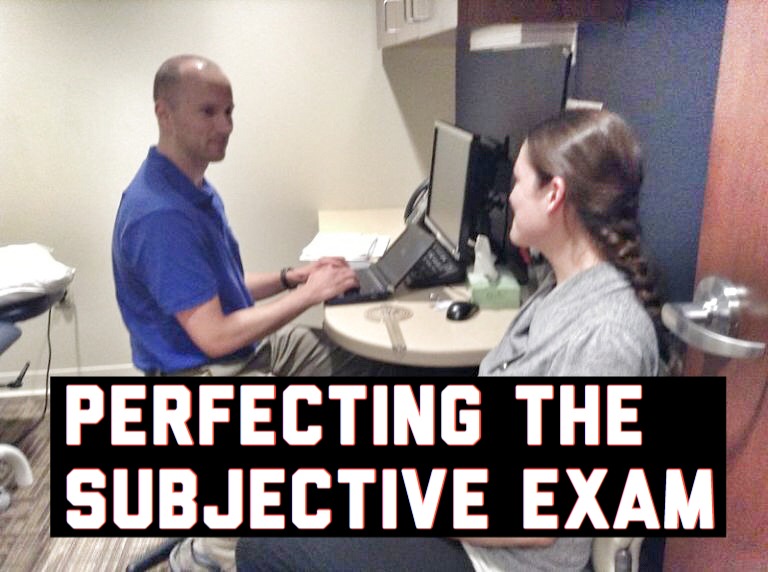The subjective examination is that first conversation, that first point of contact you get with a client. Your first chance to understand them and win them over.
But what if you stumble during this crucial piece of the client interaction? What if you miss out on the key ingredients? What if you keep someone on your schedule who you can’t help?
Well, if you listen to this podcast and check out the modified transcript below, you too will have answers to these crucial questions.
And perfect your subjective exam.
Enjoy:
Table of Contents
Modified Transcript
I think that the subjective examination is incredibly important, but not for the reasons you’re normally taught.
Here’s what you can get from the subjective examination.
Eliminate Red Flags
The subjective examination allows you to determine this very important question:
Are you the right person to help your client reach their goals?
Let’s suppose that you have a client who comes to see you and they have low back pain. They begin to tell you thinks like “This pain has been going on for about three months, I saw someone before and it doesn’t seem like anything changed. Also, I’ve lost about 25 pounds and I haven’t been trying. I can’t think of anything that makes it worse. Also I’m over 55 years old, and I’ve had a history of cancer. Can you help?”
Well, if you’re not the oncologist, the answer should be a resounding no. There doesn’t seem to be any exercise, manual therapy, or nutritional intervention that is going to eliminate an active cancer. But it is answering yes to those things that I mentioned previously that would really increase your odds of having cancer.
So it behooves you to find the practitioner to help them. Their goal might be to get rid of their low back pain, but the fix isn’t exercise. The fix is working with an oncologist to take care of the cancer.
They can still have the same outcome. It’s just the means to achieving that outcome are not within your skillset. And you really have to understand what your skill set is to determine what problems you can solve, and which skill gaps require referrals. Most of us aren’t personal trainers, physical therapists, and oncologists.
To expedite potential refer out scenarios, we have a form where I work that asks questions about all of the body systems. Do you have digestive issues? Have you implants of any kind? Do you have any urinary stuff? Do you have any reproductive issues? Any surgeries? All of these questions and more need to be answered to ensure the right person helps the client efficiently reach their goals.
It may not be that you have to refer out for all these problems. It may be that. You might be the fix, but you might expedite the client reaching their goals if you get the help from your friends. Maybe you have someone who has both low back pain and digestive issues. Now there are cases that I’ve had where we worked on movement and digestive issues seemed to improve.
But that’s not always the case. This individual may need to work with a nutritionist, gastroenterologist, and/or a functional medicine practitioner. But you don’t know that until you pry a little bit more. It may be that when these disciplines work together, the client sees much better results.

I’ve also had cases to where maybe I am the fix, but I might need my client to see someone else first before they work with me.
When I do my movement consultations online, I have to do a very good job of sifting through whether or not I can help this person. Many times, due to the limitations of the online consultation, I may need that individual to see someone in person because there are certain things I can’t test.
A recent client of mine comes to mind. He reached out to me saying and he was having trouble breathing and swallowing. It didn’t seem like this was a recent onset, it’s been going on for a minute. So it didn’t seem like it was a serious medical issue that needed to be checked right now. But it’s very hard for me to look at anything airway-wise online unless we are talking about diaphragm position. If you have someone who has trouble swallowing, it would make sense to check out the local airway first to make sure that there’s nothing major going on.
So what I told him was to see a dentist who does things with airway management, because it may be the case that due to some type of maxillary issue or issue along the airway that perhaps a dentist can provide some type of intervention to help that individual reach their breathing goals a lot sooner.
I still may play a role if you have someone who has a structural problem that’s leading to the issues that the client is mentioning, that needs to be taken care of first.
When he did see the dentist I was a little worried because the dentist didn’t see anything crazy, but I needed that question answered first.
It’s really about finding the right practitioners and collaborating with the right practitioners to benefit the client to the highest degree. If you don’t have a good subjective examination. If you don’t know what questions to ask. You’re going to have a hard time doing that.
Building Rapport
The next most important thing you can garner from the subjective examination is a relationship. Rapport building. Because if your client doesn’t like you, no matter how good you are, you will fail, and most importantly, your clients will fail.
We can’t have that! So we can use the subjective examination to build rapport, build that relationship, show them that we care to get the buy-in necessary to reach their goals.
Most physicians interrupt their patients anywhere from 12-23 seconds1,2 . This is unacceptable because the most impactful way you can build a relationship with anyone is by listening to them. And if you are interrupting them that quickly, then you are not listening.

The way I start my subjective exam, to maximize the listening factor, is first asking if it is OK. to take notes while we talk? While I want to make sure I build rapport, fam also has to get his notes done. Paperwork is a monster. I’ve had a few clients freak out because as I type while I’m talking and listening to you, I maintain eye contact. In these cases, I’ll let my paperwork sit and have a face-to-face conversation with that individual.
The second thing I ask is an open ended question. Open ended questions are going to get your people talking and that’s what we want. The more people talk about themselves, the more they’re going to like you, the more they’re going to think you understand them, and that you’re hearing and listening to them.
The open ended question that I start with is “how may I help you?,” and I s hut up. I do not say anything. I let them talk until there’s a lull in the conversation. Because a lot of times they’re going to tell you everything you need to know about what’s going with them, what type of condition they are presenting with, and what you need to give them.
So if you can listen, ask questions to clarify things, chime in here in there with words of encouragement or agreement, that’s going to help you build that connection.
Condition-related questions
I remember that we when I was in my residency we had to have a really drawn out subjective because our intent was to essentially diagnose; is it the facet, is it the multifidi of that segment, is it the nerve root?
I don’t think that’s necessary. So I’ve really pared down the big questions that I need answered, and use the subjective mostly to build rapport.
But I think there’s some key questions you need to eventually ask. You need to understand:
- How the problem started?
- How long ago the problem started?
- What things make it better?
- What things make it worse?
Those are really the big things that I want to understand when we’re talking about the condition. All of that information is going to give you idea in terms of what type of pain presentation you’re dealing with. If you listen to my pain talk, you’ll understand whether this is an ischemic-based presentation or more central sensitivity-dominant. That gets answered in a subjective examination.
I think the aggravating and relieving factors are important, but not because it tells you whether this is an inflammatory condition or not, but because it helps you link back to your client’s goals.
I talk about this in a prior podcast, but you always want to anchor back to what things are having trouble with. If they can’t lift objects off of the ground at home because they’re back hurts, and you’re giving them a technique that has nothing to do with lifting, you have to link back to that somehow, and you don’t know what to link back to if you don’t ask. So those factors are important for educating your clients.
Developing a deeper connection with clients
With any type of interaction, regardless of if it’s clinical or personal, you want to get beyond small talk as quickly as possible. You shouldn’t be talked about the weather every single day that you work with someone, that’s so boring.
I challenge you to really get to know your people and find out something interesting about them. There are a few questions that I ask during the subjective and testing that do this:
- How do you spend your day?
The wording on this question is very specific and has a good reason behind it. I used to ask: “What do you do for work?” but as you work with more and more people, you realize that not everyone has a job, and that may lead to negative feelings. Maybe they’re a stay at home mom and they might think you are judging them because they don’t work. Or maybe they’ve been on disability for six years and they might feel like you think you’re just that that they’re just trying to get a handout.
If you ask the job question and they don’t have a job, you just got a big ding against you that you’ll have to work pretty hard at overcoming.

Whereas if you ask “what’s a day in the life like for you?” you’ll find out what’s important to that person. Not everyone is going to mention to you that they wake up, do their bidness, and then go brush their teeth; but they may mention that they have two kids they enjoy playing with when they get home. You can then branch off into a near-infinite number of topics from this single question.
This question also helps clarify their goals, expose them to other problems they may need your help with, and much more.
If they do have a job, ask this one:
- What got you into your work?
You want to go beyond facts. You want to get into why and feelings. This questions allows the client to tell a story. They get to create a narrative about how they arrived at their current situation and their job.
And if they don’t like their job, you can switch things up with this question
- What would be your dream job?
I’ve asked that to a lot of people, and this question can lead to some really interesting conversation. Now you’re getting into what makes them tick; what makes them happy.
You’ll notice that all of these questions I asked are rapport-building in nature, open-ended, and do not involve me revealing anything about myself. It’s about the client revealing about themselves.
If you get ’em talking, they’re going to like you.
Here’s another great question, which I typically ask during the examination:
- where are you from originally?
That will always lead to good stories. Maybe they’ve lived in the town that you’re working in for a very long period of time. Then you can ask them how the town has changed over the years? Why’d you decide to stay here? Ever thought about moving somewhere else? What attracts you to the town now?All good questions to build understanding and connection.
If your client is not a born-and-raised in town person, then you can ask them what their hometown is like? What brought you out this way? Want to stay here? What do you like most about here?
These questions give you so many conversation branches to talk about over the next several sessions.
Ending the subjective exam
Before I dive into the objective examination I like to provide a sense of closure to that point. We are done with the big conversation, and it’s time to get into the nitty-gritty.
Typically what I do at the end of my subjective is I go into a little spiel about why all of those questions that I asked mattered.
My spiel sounds something like this as of the year 2018:
“Thank you so much for answering all those questions, because it helps me immensely make better decisions for you.”
The reason why I say that is if you thank someone, show them you’re that grateful that they revealed so much, it’s another way to get that person to like you.
Be thankful that they did a good job providing a history, because those questions will help you make an informed decision.
Then what I’ll say is:
“We’re going to look at everything on you, because your whole body moves as a cohesive unit. If you have some type of movement problem or limitation in a particular area, that could potentially influence how this area that’s hurting is loaded. That can lead to problems in [the person’s aggravating factor].”
Linking back to the factors that they mentioned, especially that quickly, helps reinforce that you’ve listened to them. That you understand why they’re here. It’s all about getting buy in.
The very last thing I say before we dive into the exam is:
“Do you have any questions before we get started?”
Most of the time people don’t, but I want to get people talking as quickly as possible. Because the more they talk, the less I do, and the more they’ll like me because I listen. Get ’em blabbin’, and that’ll get them liking you.
I want to make sure that they feel comfortable, be confident with me, and that I’m going to meet all their needs. Answering any questions helps eliminate any prior fears, concerns, or anything else before diving into the exam.
Sum Up
To summarize:
- The subjective examination is about making sure you are the right fit for your client.
- It allows for appropriate
- It’s a time to understand the person in front of you and their condition
- It helps the client feel safe
- It helps them better reach their goals.
And if you do cover these things every time you have that initial meeting; ya gonna be in bidness.
What are your big keys to the subjective examination? Comment below and contribute to the fam!
References
- Phillips et al. Physicians interrupting patients. 2017. JAMA.
- Rhoades et al. Speaking and interruptions during primary care office visits. 2001. Fam Med.33(7):528-32.
Photo Credits



